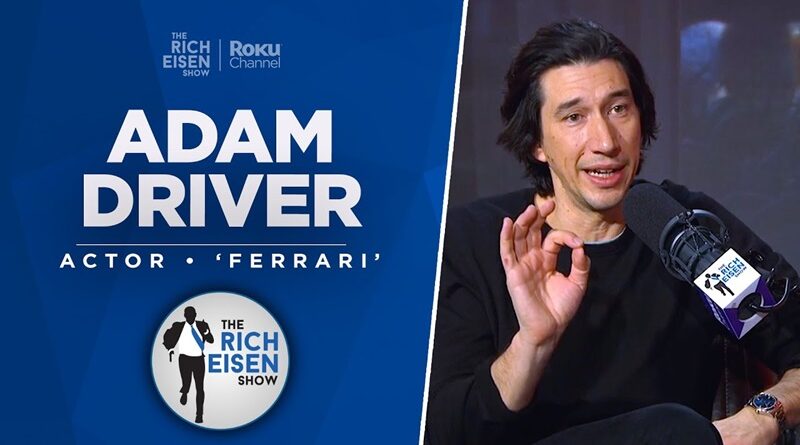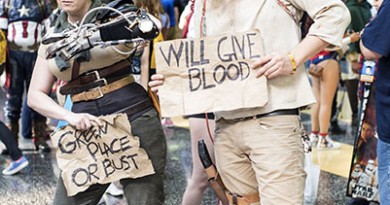Adam Driver Confirms The Rise of Skywalker Changed Kylo Ren’s Character Arc
Almost four years to the day from the theatrical release of The Rise of Skywalker, actor Adam Driver has shared additional definitive confirmation that the third movie of the Sequel Trilogy changed the story from the original conception of Kylo Ren and from his character arc in progress during the first two films. Although much evidence of this fundamental pivot in Kylo Ren’s ending was available at the time of, and in the year following, the movie’s release, Driver’s latest remarks reveal how significant and stark the change felt to the actor playing the character.
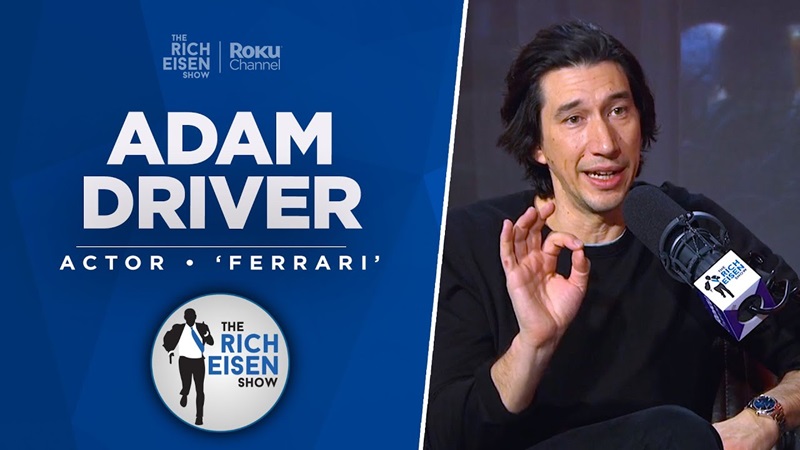
During his promotional tour for director Michael Mann’s biopic Ferrari, in which he stars as the eponymous legendary Italian automaker Enzo Ferrari, Driver sat down for a half-hour interview with host Rich Eisen on Roku Channel’s The Rich Eisen Show. In addition to Ferrari and Driver’s other work, Eisen naturally had some questions about the actor’s experience working on Star Wars. One topic included the notoriously high level of secrecy surrounding Star Wars movies while they are in production. At the 17:30 mark in the interview video posted to YouTube, Driver tells Eisen about his initial recruitment by director J.J. Abrams to portray Kylo Ren in The Force Awakens within those constraints: “J.J. walked me through what he wanted to do with the character, but you had to sign up and be like, ‘Okay, yeah, I’m gonna to do it’” before being allowed to read the film’s script, which took place after Driver had arrived in London to begin his participation in pre-production. The conversation then continued:
Eisen: Did you know that, at least, you were playing Vader 2.0? Did you know that conceptually going in?
Driver: I did, yeah. And I had an overall arc in mind that he wanted to do. Which then changed. His idea was that – almost the opposite journey of Vader? Where Vader starts the most confident, the most committed to the dark side, and by the last movie he’s the most vulnerable and weak. He wanted to start it the opposite. Where this character was the most confused and vulnerable, and by the end of the three movies would be most committed to the dark side. I tried to keep that arc in mind, regardless if that wound up not being the journey anyway. Because it changed while shooting.
Eisen: Right!
Driver: Right. But I was still kind of focused on that.
Eisen: When did it change?
Driver: Well, with Rian, he took it into a different direction, but it still tracked with the character. And then the last one, it changed. Into being about them, and the dyad, and things like that. And evolving into Ben Solo. That was never part of it.
Eisen: That wasn’t either?
Driver: No, no, no. No. Well, he was Ben Solo from the beginning. But it was never a version where we actually see Ben Solo, when I first signed up for it.
The first part of Driver’s answer, discussing the reverse-Vader character arc pitched by Abrams, is nearly verbatim from comments Driver made in December 2019 during the promotional tour for The Rise of Skywalker. The ease with which Driver relays that same explanation – almost a decade after his first discussions with Abrams – indicates how embedded those ideas are in his understanding of the character.
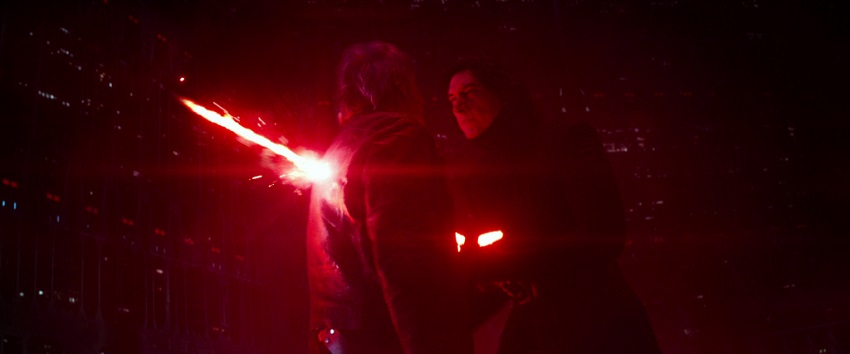
To Driver, The Last Jedi takes “a different direction” than The Force Awakens, but one that “still tracked” the character arc conceived by Abrams. This is understandable given Driver’s focus on his portrayal of his character. In The Force Awakens, Kylo Ren’s motivations center on his family: he is pursuing the map to the first Jedi Temple, where his uncle (and Jedi mentor) Luke Skywalker is likely to be found; he and Supreme Leader Snoke consider his mother Leia Organa’s Resistance to be the principal (non-Jedi) threat to the First Order; and he must face down and kill his father Han Solo to prove his commitment to the dark side. Amid this, Rey is basically an interloper; she is a random stranger who becomes mixed up with the map, the Millennium Falcon, and the long-lost Skywalker lightsaber. In The Last Jedi, by contrast, Kylo Ren’s attention turns more heavily to Rey, seeking to sow mistrust between Rey and Luke and to lure this unexpected incipient Jedi apprentice onto a dark path. Yet in the film’s fourth act Rey is all but absent from the story while Kylo Ren reverts to his primary fixations by expressly seeking to murder both his uncle and his mother during the Battle of Crait. As The Last Jedi ends, Kylo Ren is more evil and more committed to his dark path than when the film began, and film scholars easily recognized Rey’s act of shutting the door as Rian Johnson’s use of familiar and longstanding cinematic symbolism to represent her severing of any mutual future they might have shared.
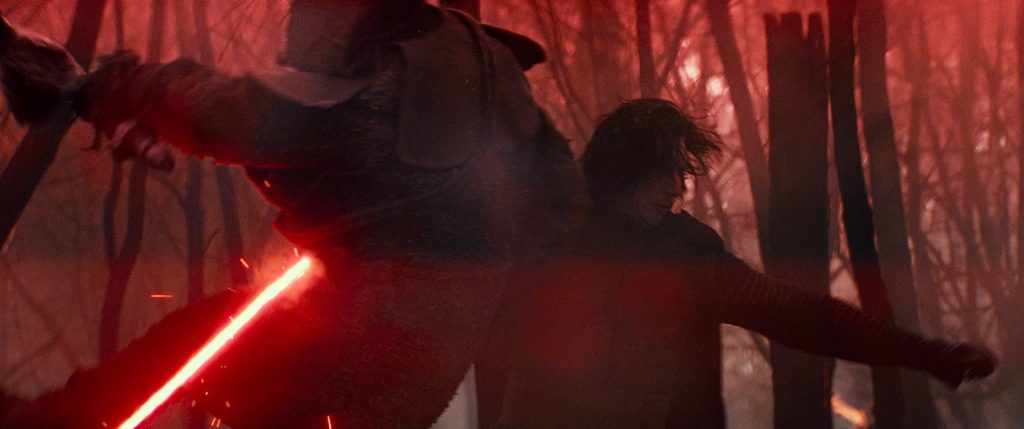
Similarly, for Driver it is Episode IX that “changed” Kylo Ren’s story. Although Driver does not mention it directly in this interview, the December 2016 draft of Episode IX by Colin Trevorrow and Derek Connelly, titled Duel of the Fates, mostly played out the original intention for the character arc and its development through The Force Awakens and The Last Jedi by making Kylo Ren the movie’s Big Bad and Rey’s implacable adversary – until the very end of the film, when Leia’s intervention prompts her son into an abrupt step back from his murderous dark path in the moments before his death. Only in The Rise of Skywalker by J.J. Abrams and Chris Terrio did the story evolve to include a Force dyad between Rey and Ren, an extended period of time in which a post-Kylo Ren version of Ben Solo appears onscreen, and a brief overtly romantic moment with Rey before his death. This new interview reaffirms Driver’s perspective that such events were not the story or character arc that he believed he was portraying in the first two films of the Sequel Trilogy.
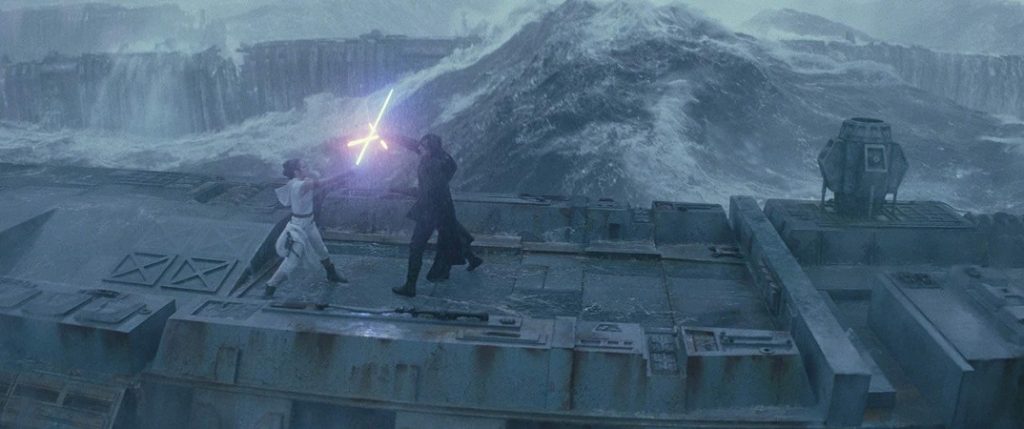
During the years when the Sequel Trilogy was in progress, it was common to see fan discussions – from a variety of fandom perspectives and backgrounds with the Star Wars franchise – rejecting the understanding of Kylo Ren’s character arc that Driver knew and portrayed in The Force Awakens and The Last Jedi. Ultimately, many of these fans were confounded by a simple decision at the core of the Sequel Trilogy: to end the Skywalker family saga and eliminate the prospect of future tales on the timeline with such protagonists. To be sure, many fans also shared favorable views toward moving Star Wars away from a dynastic story and into a more open galaxy in which anyone can be the primary protagonist. But the fandom as a whole can be forgiven for thinking that, surely, Lucasfilm would know better than to release movies titled as Episodes VII, VIII, and IX of the Skywalker saga if the story being told would not only end the stories of the three heroes of the Original Trilogy, but also kill off their sole familial heir as the story’s evil antagonist (or, as it happened, following a brief and dissonant redemption).
With Dave Filoni recently promoted to Chief Creative Officer, hopefully Lucasfilm will be better positioned to ensure story and characterization consistency in its future films and Disney+ series involving principal recurring characters. And, perhaps, to rehabilitate the Skywalker Saga from ill-advised decisions made for the Sequel Trilogy films.
New Interview:
- Adam Driver Talks New ‘Ferrari’ Film, Playing Kylo Ren & More with Rich Eisen (Dec. 12, 2023; YouTube)
Related Links:
- The Last Jedi’s Unexpected Star Wars Story Structure (Dec. 2017)
- The Last Jedi and the Hero’s Journey – Part Four: Kylo Ren and the Villain’s Journey (Feb. 2018)
- We’ve Been Here Before: Parallels in the Public Narrative on the State of Star Wars (June 2018)
- Rey Deserved Better: The Failures of The Rise of Skywalker, Part 1 (Jan. 2020)
- The Fates of Kylo Ren and Ben Solo: The Failures of The Rise of Skywalker, Part 3 (Jan. 2020)
- The End of the Skywalker Saga: The Failures of The Rise of Skywalker, Part 5 (Jan. 2020)
- The Failures of The Rise of Skywalker, Part 6 (Jan. 2020)
- Reconsidering Rian Johnson’s The Last Jedi After Knives Out (Sep. 2020)
- The Story Process Origins of a Dissonant Redemption: The Rise of Skywalker Revisited (Sep. 2020)
- New Insights on the Flawed Finale: The Rise of Skywalker Revisited (Sep. 2020)
- BJ Priester Talks The Acolyte Episode 6 on Who’s the Bossk? - July 7, 2024
- Dave Filoni Talks Writing AHSOKA and Guiding the Future of Star Wars Storytelling - June 21, 2024
- Lessons in Franchise Management – MCU: The Reign of Marvel Studios - January 14, 2024

